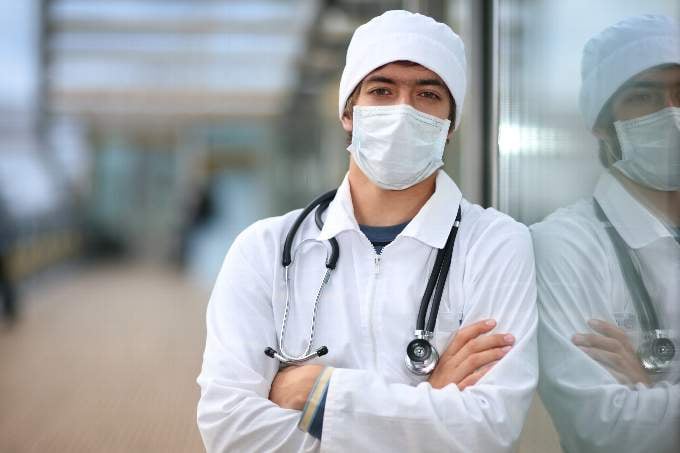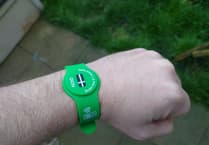NHS leaders in Cornwall are pleading with the public to not abuse National Health staff after a patient spat at a member of staff when she asked him to wear a face mask in hospital.
The member of staff, who is not being named, asked the patient to wear the face covering to help keep people safe as COVID continues to affect the NHS’s ability to provide safe health and care services. The patient refused to wear the covering, saying people didn’t have to wear them anymore and then spat in her face.
NHS leaders say GP receptionists are also being reduced to tears by patients who refuse to wear a face covering and when asked to keep a safe distance from other people when inside the surgery.
Despite the national lifting of restrictions last month, this did not apply to healthcare settings where face coverings are still required as cases of COVID are still rising in Cornwall and adding greater pressure on the health and care system.
Dr Paul Cook, NHS Kernow’s chairman, said the NHS will report any abuse of its staff to the police, and push for the highest charge possible. He said: “We have a zero-tolerance policy towards anyone who abuses our staff, and we will urge the police to make the highest charges possible for anyone who is physically or verbally abusive to someone who is doing their job.
“Our staff have worked tirelessly since March 2020, often putting themselves at risk to protect their patients. We all want to life to return to normal, but there is no excuse to spit at our staff or to make them cry. We can’t get back to normality unless everyone plays their part, so please help us so we can help you.”
During the past few days there has been a significant increase in the number of people in hospital who are COVID positive and, although the vast majority of the 95 people had been admitted for another reason many wards and bays cannot be used to take new admissions.
On Friday, Cornwall Partnership NHS Foundation Trust followed in the footsteps of Royal Cornwall Hospitals NHS Trust and made the difficult decision to suspend all visiting to its wards to try and reduce the spread of cases. Any exceptional circumstances will be considered compassionately on an individual basis. Visiting remains in place at Royal Cornwall Hospitals NHS Trust for end-of-life care, maternity, neonatal and paediatrics.
There are also 55 care homes in Cornwall which are not taking any new residents due to outbreaks of COVID amongst its residents and staff. This is having a significant impact on the NHS’s ability to discharge people from hospital and into a residential or nursing care home when they have no clinical reason to be there. This means people who are waiting in the emergency department or on an ambulance cannot be admitted to hospital as there is no bed for them to be admitted to.
Coupled with a continued increase in demand from people seeking help from family doctors, community pharmacists, NHS 111 and a lack of adult social care packages to support people, Cornwall’s health and care system remains under huge pressure.
Dr Cook said the system has not been under this much pressure during the past two years and is once again urging people to use the most appropriate service for their condition, and to stop acting as if the pandemic is over. He said: “We want to be honest with the public about the significant pressures we’re under, the sheer volume of demand we are managing from people seeking help, and the impact COVID is having on our ability to provide the safe care we want to.
“COVID cases are rising fast in Cornwall and it’s affecting our ability to keep patients and staff safe. We have also seen an increase in people being aggressive towards our staff when asked to wear a mask in our hospitals, GP surgeries, pharmacies, and clinics because they think COVID has gone away. It hasn’t.
“We need people to keep helping us by wearing face coverings, keeping a safe distance from others, getting vaccinated, testing regularly, especially if coming to an NHS location, and to only call 999 or visit our emergency department if they have an urgent, life-threatening condition."
How you can help:
• Use your pharmacist. GPs are routinely being contacted for advice and treatment of urinary infections, back pain, and coughs and colds - which can all be treated by phone or by a pharmacist.
• Always call your GP first if you need urgent or routine help. Your GP may speak to you on the telephone or by video call, but will always ask to see you in person if needed. Please be patient, and please be kind to the receptionists who are trying to help you.
• Go online to NHS 111 or call 111 if you need urgent help or your GP surgery is closed and it cannot wait until they reopen.
• Encourage parents to download the free NHS HandiApp which provides advice about common childhood conditions. Most fevers, and coughs can be treated with Calpol, drinking water, and will improve within a week. Call your GP or 111 if your child does not get better, or their condition worsens.
• Protect our ambulance service and the NHS by only calling 999 in a genuine, life-threatening emergency, and do not call back for an arrival time.
• Encourage families to take their relatives home when they are ready for discharge. Financial support is available in the form of a one-off discharge grant for people who are ready to leave hospital but need a bit of extra care and support to return home. Part of the national hospital and community support discharge policy the grant will help ease the current challenges around access to regulated care across Cornwall and Isles of Scilly and support discharge from hospital.
An NHS spokesperson said: “We promise that we are doing all we can to strengthen the position of the health and care system in response to the pressures. We are grateful for your support.”




